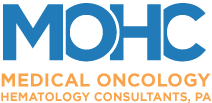Cellular therapy is a term used a describe treatment with either the patient’s own blood cells, or cells from a human donor. At the present time these can include Bone Marrow cells, Stem cells (the equivalent of bone marrow cells, taken from the peripheral blood), T-lymphocytes, dendritic cells and NK cells.
Bone Marrow & Stem Cell Transplants
Bone Marrow and Stem cell transplants can be used from a donor when the patient has a bone marrow disease, such as leukemia. Intensive chemotherapy and possibly whole body radiation (TBI) are used to kill the bad cells; then the patient is rescued with a donor product. This “good” marrow also provides additional cancer killing properties. Most often, the donor is a blood relative (matched Allo BMT) but this isn’t always possible. Then, a search can be made through world wide registries for a matched but unrelated donor (MUD BMT). Under certain circumstances, when there is a need to treat a cancer with extraordinarily high doses of drug therapy, the patient’s own bone marrow/stem cells can be used- an “Autologous” transplant or rescue (ABMT) Members of MOHC were instrumental in bringing this technology to Delaware in the early 90’s.
TIL Therapy
TIL (Tumor infiltrating lymphocytes) therapy is an experimental approach to treating certain cancers. A portion of tumor is obtained and T-cells present within the substance of the tumor extracted. These cells are treated in a laboratory to make them more aggressive and to increase in number. Then are then re-infused into the patient to attack the cancer with increased rigor.
CAR-T Therapy
CAR-T therapy is a new therapy with a great deal of promise. T- lymphocytes are extracted from a patient’s blood. They are then engineered with a retro-virus to recognize tumor; proliferated and re-infused into the patient to attack resistant cancers. Presently approved by the FDA for certain types of childhood leukemia and adult lymphomas, they are likely to become available in the future for multiple myeloma and solid tumors.
